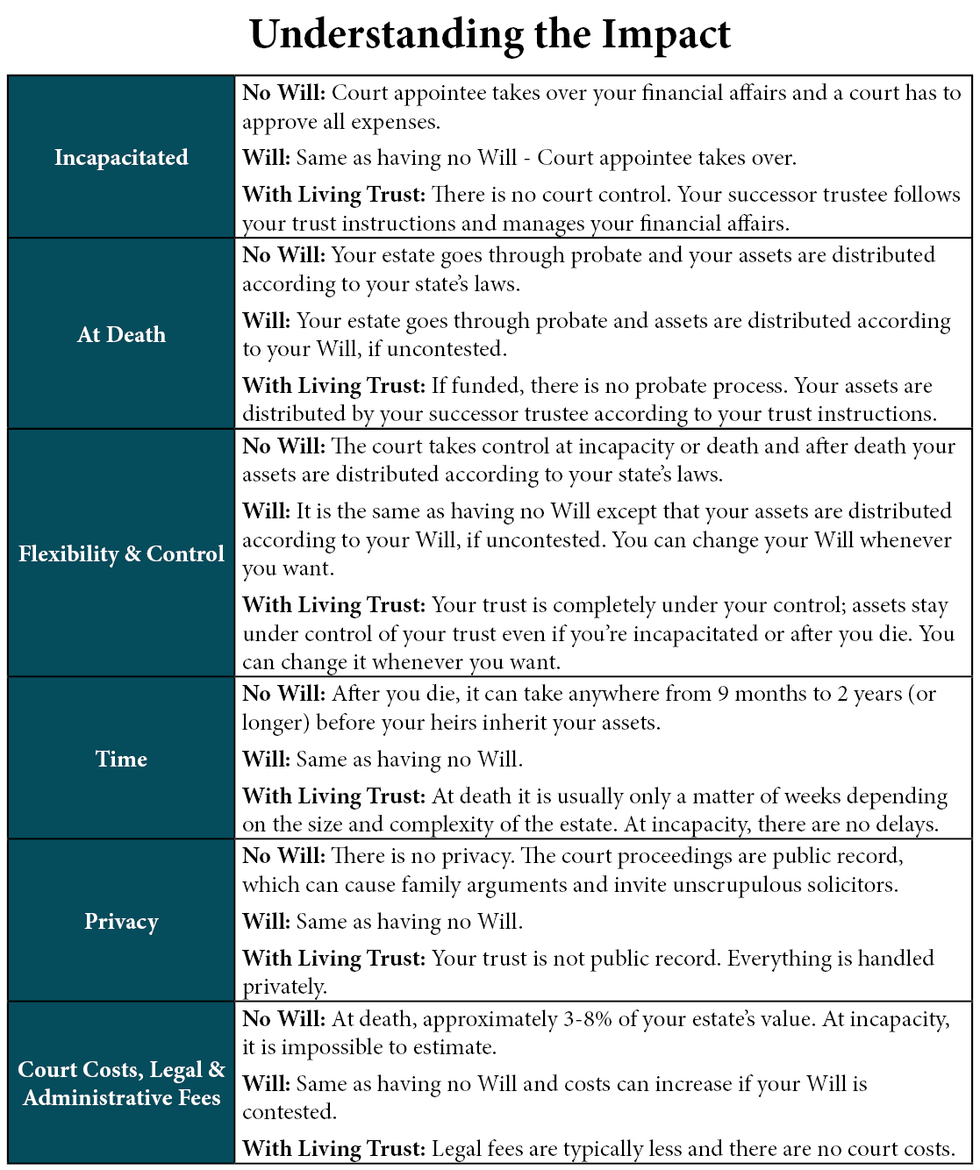
What if you could control and protect your wealth while you were alive and well and have confidence that, in the event you become disabled, those you choose will have authority to take care of you and your family? And, what if you could intentionally transfer your values and assets after your death to whom you want, the way you want, when you want, while optimizing administrative costs and tax savings? You can do all of that and more with a Living Trust as the foundation of your Estate Plan.
Have you wondered if a Living Trust is right for you? If you have a Will, do you also need a Living Trust? Lizette B. Sundvick, Esq., founder of Sundvick Legacy Center, explains the benefits and differences so you can make educated decisions about your Estate Plan and ensure you leave your legacy by design, not by default.
What is a Living Trust?
A Living Trust is a legal document that allows you to establish a separate entity (the trust) to “hold” legal title to your assets while you are alive, and to name trustees to manage those assets according to the trust terms. Typically, you serve as the trustee while you are alive, managing your assets for your own benefit. Upon your disability or death, the trust terms name your successor trustee to continue to manage – or distribute – the assets held in trust. A properly drafted and maintained trust can accomplish many goals, including guardianship and probate avoidance for your estate and bloodline, marital and creditor protection for your children. Sundvick Legacy Center likes to think of a Living Trust not just as a simple document but as a living thing that grows and changes along the way with you to always match your wishes and protect your legacy.
The Benefits of Having a Living Trust:
- Avoid probate
- Gives you and your successors complete control over your assets while you are capable, incapacitated, and after death - there is no court involvement or control
- Can reduce or eliminate estate taxes - your trust can leave up to a certain amount to your heirs federal estate tax-free
- Provides privacy - your estate does not become public record
- A Revocable Living Trust can be updated as your life, family dynamics and assets change
- Prevents unintentional disinheritance - your money stays with who you intended even if your spouse gets remarried
- Your assets can remain in your trust until you want the beneficiaries to inherit them
- Difficult to contest
Do I need a Living Trust?
You don't have to be a millionaire, but you do need to care. If you have a legacy you want to protect you should have a Living Trust. There are many benefits to having one that might appeal to you as outlined in this article. Discuss with your estate planning attorney if a Living Trust is right for you.
If I already have a Will, do I need a Living Trust? What's the difference?
Only having a Will may not be the best plan for you and your family, primarily because a Will does not avoid probate when you die. Probate is a long, expensive court process that you probably don't want your heirs to go through. It's also public record, so information such as the value of your assets, and maybe even an inventory listing of them, can be seen by anyone. A Will also only goes into effect after you die, so if you become incapacitated and only have a Will, the court gets involved and a guardian controls how your assets are used to care for you. Please view the table below to understand the differences between a Will and a Living Trust as well as what happens if you have neither.

Which assets should I put into my trust and how do I transfer them?
Generally, all of your assets (real estate, bank accounts, investments, etc.) should go into your trust. There are exceptions to this rule, however, such as IRAs and 401(k)s, that can have undesirable tax ramifications if put into your trust; you should consult with your estate planning attorney to discuss your options. Simply signing a Living Trust doesn't actually "fund" your trust. Funding the trust means physically changing the titles of your assets from your name to the trustee of your trust. For example, your bank account will change from "Joe Smith" to "Joe Smith and Mary Smith, Trustees, or their successors in trust, under the Joe Smith Revocable Living Trust, dated March 1, 2019." Anything you don't transfer to the trust will be subject to probate. Most of your beneficiary designations will need to change over to the trust as well in case a beneficiary is incapacitated or is no longer living when you die. Your estate planning attorney can walk you through how to transfer everything over to your trust. Funding your trust is a priority and should be done as soon as possible to ensure your assets are protected.
What happens if I forget to transfer an asset into my trust?
When you and your estate planning attorney make your Living Trust, you will also create a "pour over Will" that will catch any asset left in your name alone without a beneficiary designation that you might've forgotten and send it to your trust. The asset will have to go through probate, but once it does it can then be distributed according to your trust instructions.
How long does it take to create a Living Trust?
The complexity and size of your estate plays a part, but generally it only takes a few weeks. And, once you have it and it's properly funded, you will have the peace of mind that comes with knowing your assets are protected for yourself and your loved ones.
A Living Trust is the foundational document of most well-made Estate Plans. And no Estate Plan is the same; no client has the exact same family dynamics, circumstances, concerns, goals, asset mix, net worth, tax issues, etc. Sundvick Legacy Center works closely with our clients to prepare an Estate Plan that works best for them and leaves their intended legacy. If you do not have an Estate Plan and want all of the benefits having one can provide, contact Sundvick Legacy Center today to schedule an appointment.


Comments
There are no comments for this post. Be the first and Add your Comment below.
Leave a Comment